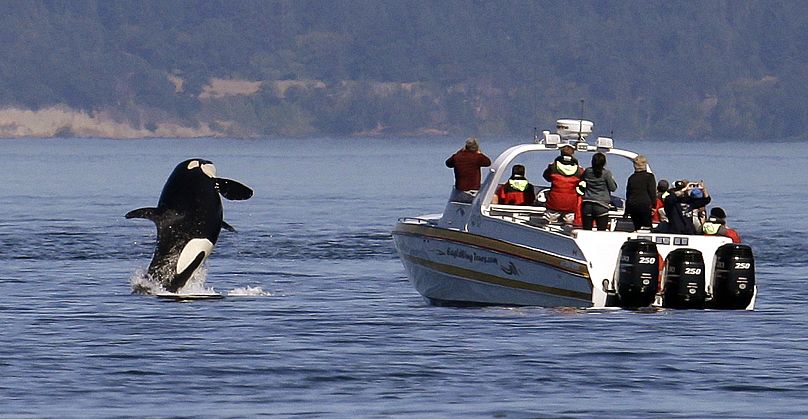There have been nearly 700 interactions since the rammings began in 2020, attributed to a small pod of killer whales.
Orcas have struck again in the strait of Gibraltar, where they sank another yacht on 12 May.
 ADVERTISEMENT
ADVERTISEMENT
 ADVERTISEMENT
ADVERTISEMENT
A 15-metre vessel was carrying two people in Moroccan waters when an unknown number of the apex predators started ramming into it, Spain’s maritime rescue service said. After issuing an alert, the pair were picked up by a nearby oil tanker and taken to Gibraltar - while the yacht sank to the seafloor.
It is one of a number of orca rammings that have taken place in the region in recent years, with other incidents occurring off the Atlantic coast of Portugal and north-western Spain.
A Polish yacht met the same fate in the strait of Gibraltar last November. In July 2023, Portugal banned tourist boats from approaching pods of orcas.
"Given the size of adult killer whales, which can reach a maximum length of nine metres and weigh between three and five tonnes [...] more intense interaction with [...] smaller vessels, used for whale watching, could have more serious consequences," Portugal's Institute for Nature Conservation and Forestry (INCF) said at the time.
Research group Grupo Trabajo Orca Atlántica (GTOA), which tracks populations of the Iberian orca sub-species, says there have been almost 700 interactions since orca rammings were first reported in May 2020.
Experts believe them to involve a subpopulation of about 15 individuals given the designation “Gladis”. But the motivation for the strange behaviour is still a mystery.
Why are orcas ramming into boats in southwest Europe?
Some experts have previously said that revenge might be behind the unusual behaviour, based on the traumatic experience of an orca called White Gladis.
After an initial collision a couple of years ago - the theory goes - she started exhibiting “defensive behaviour” against vessels, which other orcas began to copy.
The highly social apex predators typically target sailboats, but don’t tend to cause much damage. Only three boats are reported to have been sunk by orcas since the behaviour began in May 2020. It’s estimated they only touch one in every 100 ships that sail through a location.
So what’s really at the root of the behaviour?
Are orcas out for revenge?
Alfredo López Fernandez, a biologist at the University of Aveiro in Portugal and representative of the GTOA, told Live Science that the orcas are picking out boats on purpose.
“We don't know the origin or the motivation, but defensive behaviour based on trauma, as the origin of all this, gains more strength for us every day,” he said.
Some researchers suspect that the orca known as White Gladis suffered a “critical moment of agony” - either being hit by a boat or becoming ensnared during illegal fishing - that flipped a behavioural switch.
"That traumatised orca is the one that started this behaviour of physical contact with the boat," López Fernandez added.
A few commentators have gone so far as to claim that a vengeful Gladis and co are teaching young orcas to break boats’ rudders. But López Fernandez - who co-authored a study on the marine mammals in 2022 - thinks it's simply spreading by imitation among the animals.
Or are the orca visits just social?
Nobody yet knows for sure why the ramming behaviour is happening, however.
“My idea, or what anyone would give you, is informed speculation. It is a total mystery, unprecedented,” Andrew W. Trites, professor and director of Marine Mammal Research at the University of British Columbia, told CBS News.
He doesn't think the incidents are attacks; questioning why orcas would want to engage in self-destructive behaviour.
Trites’ own theory is that it’s “just playful behaviour that's gotten way out of hand.” He recalls a whale named Luca, seen off the coast of Vancouver in Canada, who swam away from his pod and started to follow boats.
"He later learned to grab onto the rudders to break them off to disable the boats, to push boats around," Trites said. "In his case, he was seeking social interactions. And he learned he could prolong the interactions by disabling the boats. And then they would have to stay with him."
It’s a funny way of making friends, perhaps. Orcas’ tactile side suggests another explanation too.
"I know of many cases where killer whales will come in and almost put their nose up to a propeller of the boat and feel the wash of the water go over them. It'd be like being in a jacuzzi," Trites told CBS.
The behaviour could be putting sailors and whales at risk
A bit of “rough housing” (if that’s what it is) might seem like harmless fun to a whale. But the impact on vessels can be damaging and dangerous for sailors.
And conservationists are concerned. While their deaths cannot be directly linked to the boat events, four orcas belonging to the Iberian subpopulation are known to have died since the behaviour began in 2020.
There were only 39 Iberian orcas recorded in the last census in 2011, and this group is listed as critically endangered by the IUCN Red List.
"If this situation continues or intensifies, it could become a real concern for the mariners' safety and a conservation issue for this endangered subpopulation of killer whales," López Fernandez and his co-researchers concluded in the study last year.
The Spanish Transport Ministry previously urged boaters to leave the area if they observe a change in an orca's direction or speed and report any interactions.











